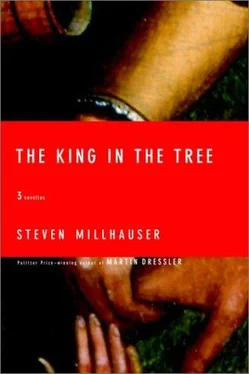After dinner they played charades or piquet in the drawing room, walked by the river, and sometimes drove in a calash along the graveled riding path that wound among the gardens. Then Hood retired to the library, to read a treatise on the cultivation of laburnum or the operation of a Newcomen engine, or to examine a bit of leaf or the wing of an insect through the microscope that stood on a corner table. A light supper of cold meats was served at nine-thirty or ten; afterward first Hood and then the women retired to their rooms. Juan, unused to going to bed before dawn, would climb the stairs to his apartment— a bedroom and sitting room in a separate wing — where his new valet had prepared his bed for the night. On the third day Juan had sent his servant back to Venice, unable to bear the thought of having about him the all-too-faithful partner of his Venetian revels; Hood had immediately supplied an English valet, the self-effacing cousin of a Swan Park chambermaid. In the long night Juan would play dozens of games of patience at an inlaid mahogany table in his sitting room. He would drink Madeira, look at the sky through the telescope that Hood had mounted for him on a stand by one of his sitting-room windows, and glance through the leather volumes of English poets that Mary had chosen for him from the library. Then he would sit for a long time in his bedroom armchair in the embrasure of the casement window, savoring his solitude and staring out at a distant turn of the Ymber before climbing into his canopied bed at three in the morning.
In the vast house, he was the only guest. Hood, for all his exuberance, enjoyed his solitude — or at any rate he was happy to shut himself up in the library whenever he liked. One afternoon his landscape architect, a quietly amiable man named William Gravenor, came to dinner, during which he unrolled a large sheet of paper that knocked over a glass of port; after dinner the two of them retired immediately to the library, while Don Juan walked with the women by the river. He knew that Hood liked him, but it struck him that he was also useful to the squire, who could disappear at a moment’s notice.
“I walk, ” Mary Hood was saying, as she and Juan walked along the path of osiers behind Georgiana and Augustus, “every day. I am walking — now — at this moment. ’Tis the difference between what is customary and what is singular. I am walking beside the river.”
“I am walking,” Juan said, “beside the river.”
“You are walking beside the river,” Mary said. “You are talking beside the river. We are walking and talking beside the river.”
“I am talking beside the river,” Juan said. “We are walking beside the river.”
“They are walking beside the river,” Mary said, pointing at Georgiana and Augustus. “The birds are singing in the trees. The sun is setting in the west.”
“Night is coming,” Juan said. “We are walking in the north beside the river. Day is dying.”
“I am going mad,” Georgiana said, glancing back over her left shoulder, “beside the river.”
He was making rapid progress in English. Mary had taken it upon herself to be his teacher, and he spoke to her easily, though an odd shyness prevented him from practicing his sentences with Georgiana. He was never alone with either woman; he wondered whether it was by design. Of the two, Mary seemed to enjoy his company frankly, while Georgiana held him at a playful distance, as if he were a very amusing piece of foreign furniture — just how amusing, he would show her in time. Georgiana liked to engage in serious discussions with her brother-in-law, about such matters as whether natural beauty might ever be excelled by artistic beauty, or how the impression made by a word differed from the impression made by the object represented by a word; Juan admired her brilliant gray-green eyes with their long, curved lashes, the green feathers she liked to wear in her thick auburn hair, and the green silk ribbons around her neck. Her movements were quick, even impatient; there was a tension in her hands and at the edges of her mouth that suggested secret energies. Mary Hood was gentler and more flowing in her motions. She liked to assume the role of teacher, repeating sentences patiently and giving examples, as if Juan were a child of seven and she a stern governess with excellent references; at dinner she preferred to listen. Her hair seemed to Juan a contradiction: light brown, like a paler, duller version of her sister’s, combed softly back from the forehead and temples, but at the back thickly ringleted and hanging to the nape; when she moved, her curls shook continually, as if her passions were in her hair. Her eyes were hazel. She was given to sudden, unexpected fits of laughter.
Don Juan understood that his genius in the art of seduction lay not in his gift of beauty, not in his power to charm, not in his fearlessness, not even in his ferocious will, but rather in a subtle evolution in the domain of feeling: his uncanny ability to burrow his way deep into a woman’s nature, to detect with precision the slight, subterranean ripples of inclination and repulsion that constituted the hidden life of women. He knew that Mary Hood enjoyed his company, and he knew something more: her interest in him quickened whenever he turned his attention toward Georgiana. Then he would sense in her body a slight stiffening, in her bottom lip a slight drawing in; and lowering her eyes, she would wait for his attention to fall on her again. Juan understood that this was not yet jealousy, but some elusive foreshadowing of it, akin to an instinct of ownership. It was as if Mary Hood had taken charge of him and didn’t like him to stray. Juan understood one other thing: it was the beginning of a particular interest in him that might, in time, take a more lively turn. It was his way in.
Meanwhile, he savored his long outings with the tireless squire of Swan Park, who proved to be a passionate horseman with a fondness for dangerous descents along craggy paths and wild gallops across open downs. The outer reaches of Swan Park were in a continual state of development and reinvention, and Hood was in the thick of things, assisting laborers as they cut a glade or opened a serpentine path through a wood, directing the construction of a pond or the draining of a swamp, and discussing with tenants on outlying farms the breeding of cattle or the cultivation of turnips. He had strong opinions about a host of subjects that Juan had never given a thought to. Lakes, Hood declared, should always be wooded to the shore, their ends lost to view among trees, and he argued that the most picturesque coppice was one composed of beeches and Scots firs. He was currently overseeing a number of exciting ventures, including an interconnected series of subterranean tunnels, a hollow hill containing a library, and several curious projects that he called “living representations”—small tracts of parkland turned into legendary or historical places that blended perfectly into the forests of oak, beech, and ash, the undulating meadows and fields, the hills and valleys of Swan Park. Passing through a thick wood, they came to a region of gently rising hills and shady dales, watered by many streams. A shepherd sat on a rock under a tree, playing a reed pipe, while eight or nine shorn sheep grazed nearby. This, Hood explained, was the land of Arcadia, where real shepherds and shepherdesses dressed in authentic Greek costumes tended flocks of sheep, whose wool was sheared by tenant farmers and sold to merchants in Flanders, while skilled musicians wearing the costumes of shepherds and shepherdesses played pipes made from reeds imported from the Peloponnesus, and actors dressed like Elizabethan lords and ladies enacted scenes of love-longing, such as sighing aloud, weeping by the sides of brooks, pining away in shady groves, and writing love sonnets to hang on the branches of trees. As they rode, Juan saw one young lord in doublet and hose leaning cross-legged against an oak, staring sorrowfully at the ground; the lord looked up at the intruders on horseback, and turned his face away with an expression of angry despair.
Читать дальше












